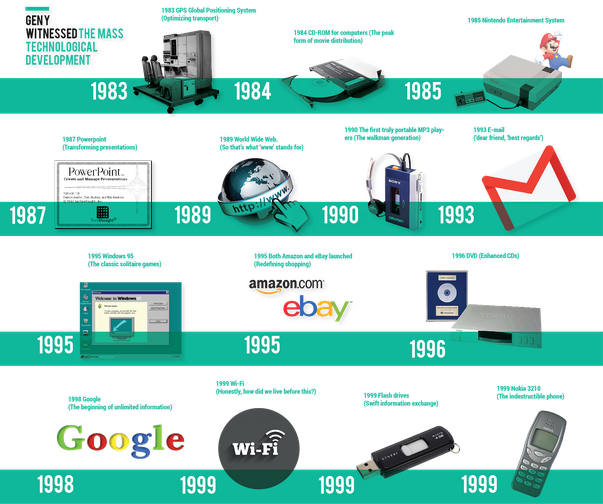
“Lazy. Entitled. Narcissists.” Also known as millennials. Or at least that’s the impression of what is considered the youth of this decade. Millennials or Gen Y are those born in the 1980s and up to the mid-1990s to early 2000s. The generation, unlike its predecessors, experienced exponential technological development and a general unprecedented change that followed in lifestyle with the emergence of these technologies. Here is an infographic highlighting tech developments:


Millennials are by far the largest generation in numbers and are now entering a phase of their lives supposedly characterized by stability and poise. Yet, as a generation that has witnessed an incredible change in lifestyle due to technology, they have a rather different worldview and outlook on what stability entails. Seemingly, Gen X had clear-cut objectives for their lives – from owning property, a vehicle, simply putting food on the table for their families and covering bills.
Millennials, however, seem to put off these purchases or not buy them at all in some cases. Yes. The hierarchy of needs has definitely changed and what was considered as essentials for previous-gen is not as important to this generation and where gen X focused on survival, millennials want to live. With this mindset, millennials have different priorities in relationships as well. Marriage rates have dropped by 50% since the 1960s and while previously the average marriage age was 23, many now put off to their 30s.
Millennials Reshaping The Economy
So how does a generation that is so afraid of commitment function? Through the use of available technologies, alternative services are surfacing and removing the necessity of actual ownership. As millennials continue to be reluctant to settle down and shy away from making homes and car purchases, their preference of low-ticket and staple needs has driven what is known as the “sharing economy” where services are easily exchanged without the need for any intermediary involvement. In this sharing economy, also referred to as the gig economy, or collaborative consumption, the need for car ownership does not become as pressing as there are viable other options for transmute like Uber, through which millennials can get easy and affordable access to car rides through only a few taps on their devices. According to author and economist Jeremy Rifkin, “25 years from now, car sharing will be the norm, and car ownership an anomaly.” Similarly, homeownership becomes a secondary concern as there are plenty of home-sharing options exemplified in Airbnb which allows individuals to have a space where homes are rented out over a variety of prices.
The Opportunities in Crowdfunding As a Fintech Model for Millennials
Millennials are also the largest generation in the labor force, representing the highest paid generation, yet they are also the most in debt. Fortunately, through fintech, millennials have a new form of financing in crowdfunding. Crowdfunding has allowed millennials the ability to raise sums of money for a variety of causes and projects including education, business, charity, and investment. What makes millennials rather stand out on an even larger scale is their sensitivity to ethics, where they truly want to be part of something that’s meaningful, or bigger than themselves.



They are healthier. They eat smarter. And they are willing to spend on health. To them being healthy isn’t a lack of sickness, it is rather a way of life. Moreover, they condemn previously celebrated traits like smoking and are more passionate about climate change. In any transaction, they are concerned with what a company gives back to society as opposed to directly adding to their bottom line. Luckily, today many environmental and ethical platforms have emerged in finance today including those driving sustainable development, climate-friendly companies and impact investment.
Ethis is an ethical investment platform which allows many to come together, raise money and earn a profit, all while knowing that their contribution has direct beneficial social impact. Click here to learn more.
Millennials and the Creation of A New Culture Online
Furthermore, with higher levels of academic education, an opinionated culture was harboured – millennials are verbal and inquisitive when it comes to most things. This combined with the internet has millennials voicing out and expressing their opinions openly and publicly. Blogs, websites and social media accounts are tools that allowed them to exchange retail transactions in an effort to maximize efficiency while minimizing expenditure. Loyalty to brands is dependant on their experiences and thus value means everything to them. Product ratings and reviews online has become a common culture along with product information, prices comparison giving them great influence on the market. Millennials’ discretionary purchases are estimated to be over a trillion dollars in direct buying power and are projected to reach $1.4 trillion this year. In addition to this, their e-commerce purchases through mobile devices has changed the face of marketing. Social media and search engines are major channels. Therefore, companies like The Marketing Heaven, which have set up online campaigns for the core of their business, have experienced a significant rise. Millennials are social media natives who source, review, and sell all-online.
All these developments led to the enhancement and betterment of living conditions and opened doors to a more comfortable life in many sectors including, education, communication, business, and entertainment. With that, unlike the previous generations, millennials had information at their fingertips within the internet, smartphones, social platforms connecting them in masses and, through Fintech, swifter and quicker financial transactions and reach. Crowdfunding especially, as a Fintech model, is capable of significantly drawing millennials into investment and entrepreneurship – allowing them investment possibilities at younger ages and giving them active participation in the economy that was not previously available for generations that preceded them due. With many services emerging and the vast range of new opportunities, one can see why millennials are different in how they choose to lead their lives. So the question here is – do these millennials live up to the descriptions or is there more to them than meets the eye?
Read more on How Islamic Finance Contributes to the Growth of Sustainable Finance





Top Posts
Islamic P2P Crowdfunding Explained
Halal Money Matters: How Muslims Can Balance Deen and Dunya with Smart Islamic Finance
Halal Investments for Singapore Muslims? It’s time for a shake-up in the Islamic Investments scene.
Smart investment for making Halal money
3 Reasons Why Property Crowdfunding is the Smart Investment for You